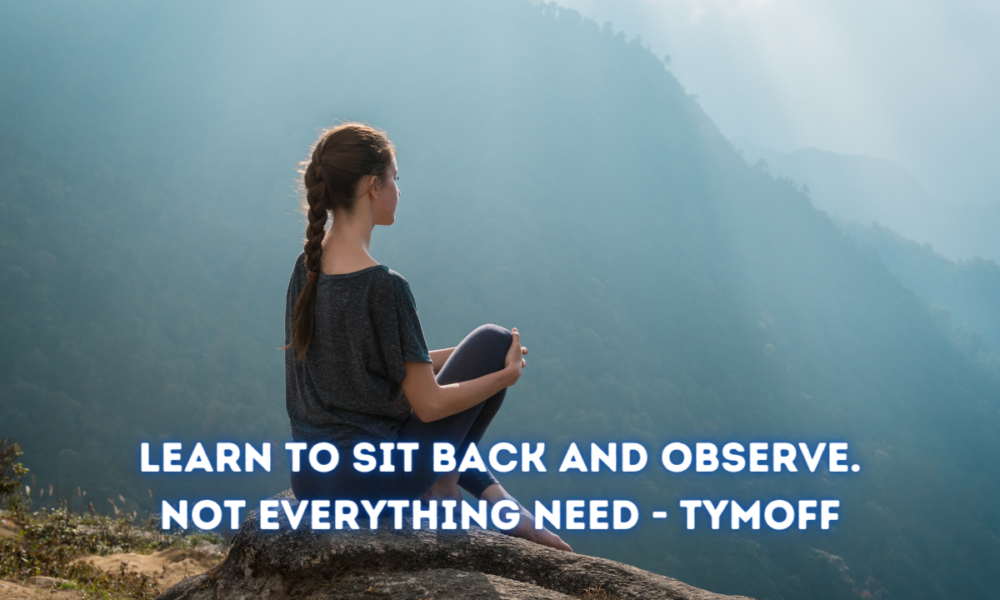Introduction
In our fast-paced, constantly connected world, the idea of sitting back and observing may seem counterintuitive. We are often driven by the need to act, react, and engage continuously. However, adopting a mindset of mindful observation can be incredibly powerful. This approach not only enhances our understanding of the world but also improves our overall well-being. In this article, we explore the benefits of sitting back and observing, how to practice it effectively, and its profound impact on our lives.
The Importance of Observation
- Understanding and Insight: Observing without immediate reaction allows us to gain a deeper understanding of situations, people, and our own emotions. It provides the space to process information more thoughtfully and make informed decisions. By stepping back, we can see patterns and connections that might be missed in the heat of the moment.
- Reduced Stress and Anxiety: Constantly reacting to every stimulus can be exhausting and stressful. Taking a moment to observe allows us to pause and regain our composure. This practice can lead to lower stress levels and a more balanced emotional state.
- Improved Relationships: Mindful observation fosters better communication and empathy. By observing others’ behaviors and emotions without rushing to judgment or response, we can better understand their perspectives and needs. This deeper understanding can strengthen relationships and improve interactions.
How to Practice Mindful Observation
- Embrace Stillness: Find a quiet space where you can be free from distractions. This might be a physical space or a mental state of calm. Allow yourself to sit back and focus on the present moment without engaging in any immediate actions.
- Observe Without Judgment: As you observe, try to do so without attaching labels or judgments. Simply notice what is happening around you and within you. This practice helps you detach from immediate reactions and fosters a more objective perspective.
- Engage Your Senses: Pay attention to what you see, hear, smell, touch, and taste. Engaging your senses fully can deepen your observation and enhance your awareness of your surroundings and yourself.
- Reflect and Learn: After observing, take time to reflect on your observations. What did you learn about the situation, the people involved, or yourself? Reflecting on these insights can lead to personal growth and improved decision-making.
Benefits of Mindful Observation
- Enhanced Decision-Making: By observing and reflecting, you can make more informed and thoughtful decisions. This approach helps you consider various perspectives and potential outcomes before taking action.
- Greater Emotional Resilience: Observing rather than reacting helps build emotional resilience. It allows you to process emotions more effectively and respond to challenges with greater composure and clarity.
- Increased Awareness: Mindful observation heightens your awareness of both external and internal factors. This increased awareness can lead to a deeper understanding of your own needs and desires, as well as the dynamics of your environment.
Practical Applications
- Workplace: In a professional setting, mindful observation can improve teamwork and leadership. Observing colleagues’ reactions and understanding their perspectives can lead to more effective collaboration and problem-solving.
- Personal Growth: Applying mindful observation in your personal life can lead to greater self-awareness and personal development. It helps you understand your own patterns and behaviors, leading to more intentional living.
- Conflict Resolution: During conflicts, taking a step back to observe the situation without immediate reaction can lead to more constructive resolutions. It allows you to understand different viewpoints and approach the issue with a clearer mind.
Conclusion
Learning to sit back and observe is a valuable practice that can enhance various aspects of our lives. By embracing mindful observation, we cultivate a deeper understanding of ourselves and the world around us. This approach fosters reduced stress, improved relationships, and better decision-making. In a world that often values constant activity and reaction, taking the time to observe can be a powerful tool for personal growth and well-being.
